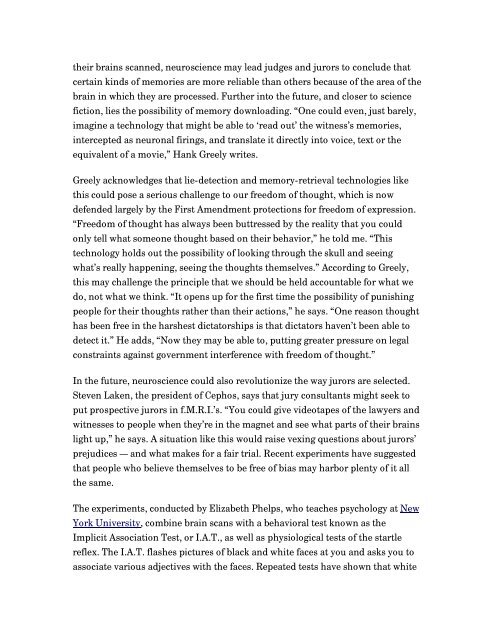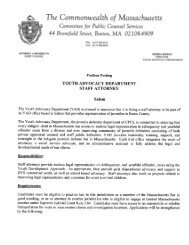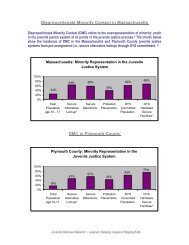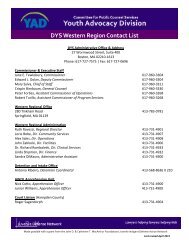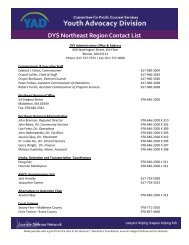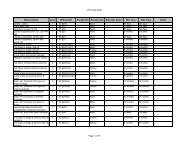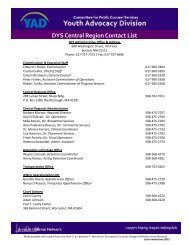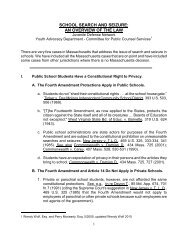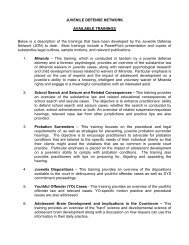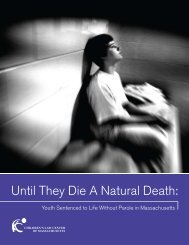States rethink 'adult time for adult crime' - the Youth Advocacy Division
States rethink 'adult time for adult crime' - the Youth Advocacy Division
States rethink 'adult time for adult crime' - the Youth Advocacy Division
Create successful ePaper yourself
Turn your PDF publications into a flip-book with our unique Google optimized e-Paper software.
<strong>the</strong>ir brains scanned, neuroscience may lead judges and jurors to conclude that<br />
certain kinds of memories are more reliable than o<strong>the</strong>rs because of <strong>the</strong> area of <strong>the</strong><br />
brain in which <strong>the</strong>y are processed. Fur<strong>the</strong>r into <strong>the</strong> future, and closer to science<br />
fiction, lies <strong>the</strong> possibility of memory downloading. “One could even, just barely,<br />
imagine a technology that might be able to ‘read out’ <strong>the</strong> witness’s memories,<br />
intercepted as neuronal firings, and translate it directly into voice, text or <strong>the</strong><br />
equivalent of a movie,” Hank Greely writes.<br />
Greely acknowledges that lie-detection and memory-retrieval technologies like<br />
this could pose a serious challenge to our freedom of thought, which is now<br />
defended largely by <strong>the</strong> First Amendment protections <strong>for</strong> freedom of expression.<br />
“Freedom of thought has always been buttressed by <strong>the</strong> reality that you could<br />
only tell what someone thought based on <strong>the</strong>ir behavior,” he told me. “This<br />
technology holds out <strong>the</strong> possibility of looking through <strong>the</strong> skull and seeing<br />
what’s really happening, seeing <strong>the</strong> thoughts <strong>the</strong>mselves.” According to Greely,<br />
this may challenge <strong>the</strong> principle that we should be held accountable <strong>for</strong> what we<br />
do, not what we think. “It opens up <strong>for</strong> <strong>the</strong> first <strong>time</strong> <strong>the</strong> possibility of punishing<br />
people <strong>for</strong> <strong>the</strong>ir thoughts ra<strong>the</strong>r than <strong>the</strong>ir actions,” he says. “One reason thought<br />
has been free in <strong>the</strong> harshest dictatorships is that dictators haven’t been able to<br />
detect it.” He adds, “Now <strong>the</strong>y may be able to, putting greater pressure on legal<br />
constraints against government interference with freedom of thought.”<br />
In <strong>the</strong> future, neuroscience could also revolutionize <strong>the</strong> way jurors are selected.<br />
Steven Laken, <strong>the</strong> president of Cephos, says that jury consultants might seek to<br />
put prospective jurors in f.M.R.I.’s. “You could give videotapes of <strong>the</strong> lawyers and<br />
witnesses to people when <strong>the</strong>y’re in <strong>the</strong> magnet and see what parts of <strong>the</strong>ir brains<br />
light up,” he says. A situation like this would raise vexing questions about jurors’<br />
prejudices — and what makes <strong>for</strong> a fair trial. Recent experiments have suggested<br />
that people who believe <strong>the</strong>mselves to be free of bias may harbor plenty of it all<br />
<strong>the</strong> same.<br />
The experiments, conducted by Elizabeth Phelps, who teaches psychology at New<br />
York University, combine brain scans with a behavioral test known as <strong>the</strong><br />
Implicit Association Test, or I.A.T., as well as physiological tests of <strong>the</strong> startle<br />
reflex. The I.A.T. flashes pictures of black and white faces at you and asks you to<br />
associate various adjectives with <strong>the</strong> faces. Repeated tests have shown that white


